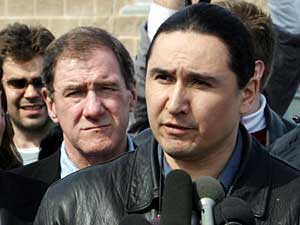Audio
Photos
More from MPR
| ||||||||||||||||||||||||
St. Paul, Minn. — The government initially charged Jourdain with conspiracy to commit murder and to commit crimes against the United States. The teenager was scheduled to go to trial on those charges in two weeks. But late Tuesday, he pleaded guilty to the least serious charge of making threatening interestate communications.
U.S. Attorney Tom Heffelfinger would not comment on the specifics of the case, or even mention that Jourdain was the juvenile involved. But he did explain the charge to which Jordain pleaded guilty.
"In my experience, it's the federal equivalent of the state crime of making terroristic threats," said Heffelfinger. "Only in this particular case, it involves the utilization of some interstate medium like a computer Internet or telephone."
The public may never know what happened in the proceedings leading up to the plea, because the case was closed to the public. Federal juvenile cases are always closed and the records sealed.
One of the few public details was reported several weeks ago, when the judge ruled the government should try Jourdain as a juvenile, and not certify him as an adult.
"That was huge. That was the most important issue in this case," says Peter Wold, a federal criminal defense attorney in Minneapolis.
Wold says while no one knows for sure what evidence the government had on Jourdain, the judge's ruling showed the teenager deserved rehabilitation rather than punishment.
|
What it comes down to is kids talking big on the Internet. ... the reality of the situation is that this young man didn't have the intent to have these acts carried out.
- Peter Wold, federal criminal defense attorney
|
"What it comes down to is kids talking big on the Internet," says Wold. "I would expect that the reality of the situation, that all sides agreed on, is that this young man didn't have the intent to have these acts carried out."
The idea that Jourdain pleaded guilty and avoided trial is not unusual in the legal system. More often than not, cases settle before trial. Former U.S. Attorney David Lillehaug says there are times when both the prosecution and the defense risk more if they go to trial and lose.
"To make a threatening communication is, by any measure, a much less significant charge than conspiracy to commit murder. And the fact that there was a plea to that charge indicates that the prosecution and the defense had a significant amount of risk," says Lillehaug.
Because Jourdain is a juvenile, the judge will have broad discretion in his sentence. An adult would have faced up to five years in prison for the offense. But Louis Jourdain can leave a juvenile facility at age 21, if not sooner. Jourdain has a right to a speedy sentencing hearing, but he could waive that.
University of Minnesota law professor Barry Feld says right now, there's little data about how federal juvenile cases actually work.
"There's only a couple hundred cases a year of federal delinquency prosecutions, and 95 percent of them involve Native American kids. As far as I know there's just never been any research on how they're handled," says Feld.
A spokesman for the Federal Bureau of Prisons says there are only 217 juveniles in custody nationwide, so the federal government contracts out with state facilities for their incarceration. The judge could send Jourdain to a facility out of state, or in Minnesota at Red Wing.






